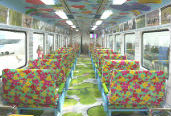When it comes to a weekend outing, many people would flock to traditional markets. It is one of Korea's singular features that there are five-day markets nationwide throughout all the provinces, including Chungcheong Province, Jeolla Province and Gyeongsang Province. Among the most popular markets is the Jeongseon Five-Day Market, located in Jeongseon, Gangwon-do (Gangwon Province).
Gangwon Province used to be an isolated, remote and mountainous area, and the center of the nation's coal mining industry. However, the region has now turned into a travel destination, popular among a growing range of tourists and travelers. At the center of all this attention is the revival of the Jeongseon Five-Day Market.
A special train operated by Korea Railroad (KORAIL) provides comfortable access to the Jeongseon Market. Designed to help people visit traditional markets nationwide, the KORAIL train makes stops at nine markets across the nation: Sacheon in South Gyeongsang Province, Andong and Gyeongju in North Gyeongsang Province, Namwon in North Jeolla Province, Naju in South Jeolla Province, Danyang and Jecheon in North Chungcheong Province, Ganggyeong in South Chungcheong Province and, finally, Jeongseon in Gangwon Province.
Departing Seoul Station, the train runs along a winding mountainous route, instead of a straight railway as found in other parts of the country. Out the windows unfold majestic mountains and diligent farmers cultivating their fields. About four hours later, the train pulls in to Jeongseon Station.
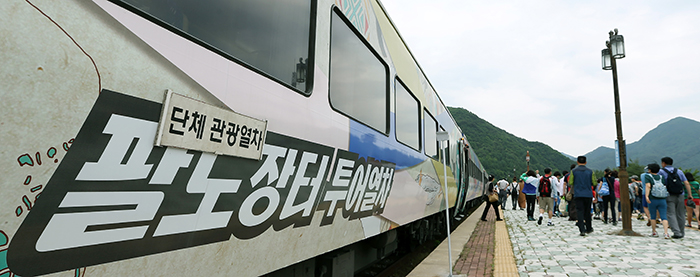
With about ten minutes of walking, travelers arrive at the market. The most prominent commodities for sale in the market are varieties of wild edible greens, picked from the neighboring mountains. The mountain herb gondeure, a member of the thistle family (Cirsium setidens), is one of the most popular. A number of tourists are seen purchasing and holding fists full of gondeure on their way back to the train.
Jeongseon is located at higher altitudes and is known for its gondeure harvest. In fact, thanks to the region's geography, with 22 mountains higher than 1,000 meters, the county has plenty of limestone and argillaceous, or clay-like, soil.
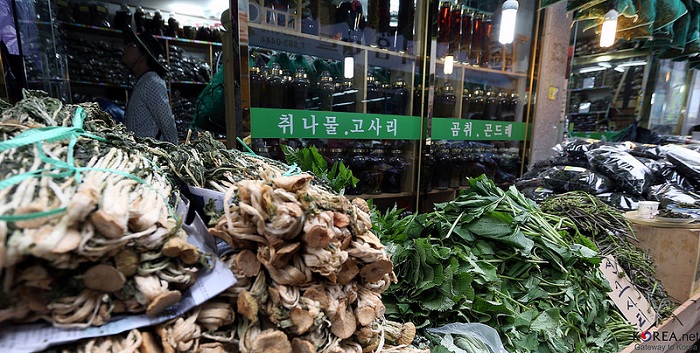
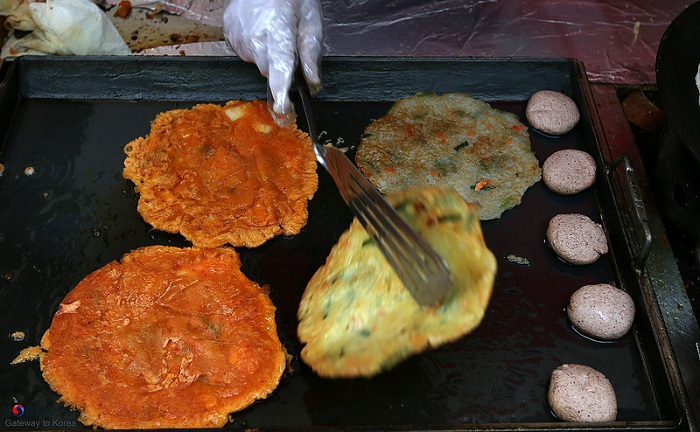
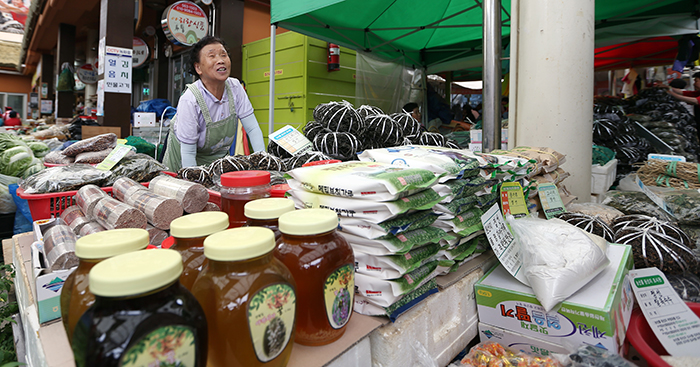
A number of events -- a magic show, musical performances, traditional singing and a rice cake dough-pounding performance -- take place across the market. By lunch time, the travelers are eager to taste some of the cuisine that's on display. Two of the best options are gondeure mixed rice, a bowl of steamed rice mixed with the wild green, and "tadpole noodles," or olchaengi guksu in Korean.
Tadpole noodles are made from a paste of water and ground corn. It was named as such because the noodles look like a tadpole when the paste is sifted through a wooden sifter. The noodles are served seasoned or with condiments. Due to being not very glutinous, the noodles break easily and patrons are encouraged to use spoons to complete their meal.
KORAIL also offers a bus to the Ojang Waterfalls. Originating from the Ojangsan Mountains, a northwestern branch of the Nochusan Mountains in Jeongseon, the waterfalls fall 127 meters in vertical height over a horizontal distance of 209 meters. The magnificent view of the waterfalls seems to sweep away all the summer heat.
Back on the train, the next stop is Auraji Station, the starting point for the draisine, or rail bike, rides, the highlight of any trip to Jeongseon County.
Travelers hop on either a rail bike or a miniature train, the so-called "Scenery Train," to travel along a closed 7.2-kilometer stretch of railway from Auraji Station to Gujeolli Station. A group of pedal-powered rail bikes passes first, and the miniature Scenery Train follows. The passengers on board enjoy a cool and gentle breeze, the scents of nature and the picturesque landscape, all that a moving open-air miniature train can offer. It feels like the Ojang Waterfalls and the Nochusan Mountains are close by.
On the way back and forth to Gujeolli Station, one of the tour guides broke out into song, belting out a local version of the famous folk song "Arirang." In 2012, the lyrical folk song was registered on UNESCO's list of intangible heritage items.
Lee Gak-sun, one of the more elderly travelers on the trip, came there with two of her friends. She said she enjoys travelling across the various regions of Korea and abroad. "Every summer, we pay a visit to the Jeongseon Market. It's like an unspoken promise between us," said Lee. "We always buy some gondeure and other fresh foodstuffs there."
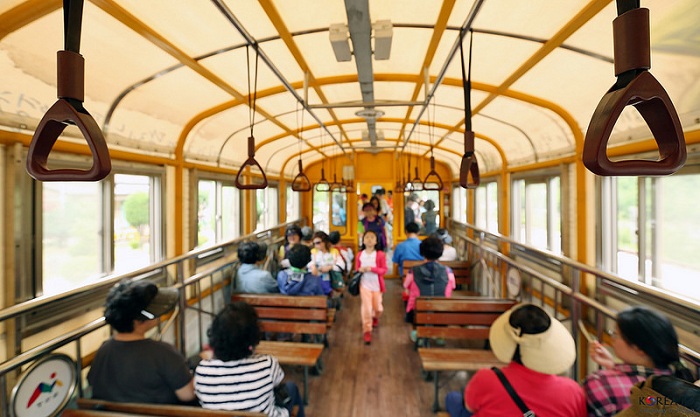
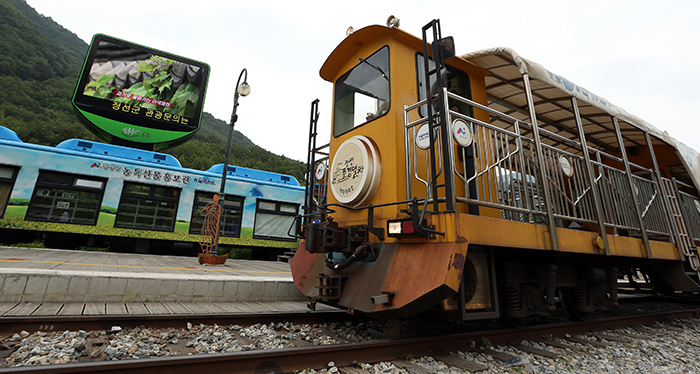
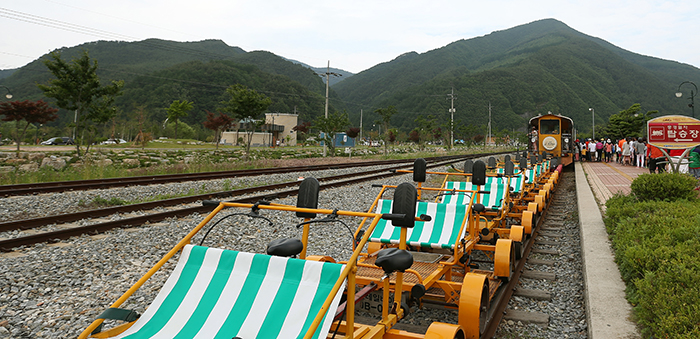
Jeongseon County in southeastern Gangwon Province has a lot to offer visitors all year round. The region has become the center for many outdoor activities, from water sports through to rail bikes, "sky walking," where you walk out over a precipice on a clear-floored platform, and rafting along the Donggang and Joyanggang Rivers. In the winter, the county sees a flock of tourists in search of skiing and snowboarding opportunities at the High1 Resort.
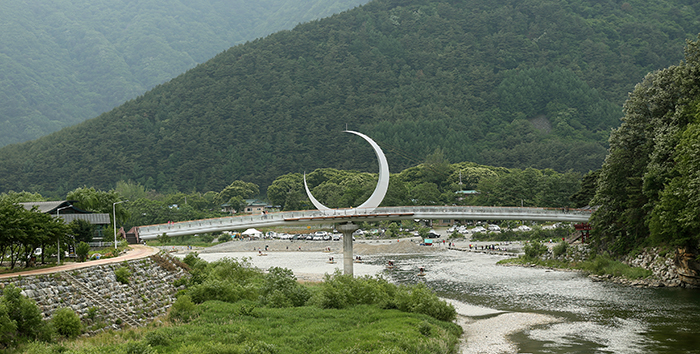
Back on board, the full-sized train returns to the bustling Seoul Station in the evening, bringing with it the warmth and affection of the mountain village. It makes us all dream of another trip.
By Lee Jeong-rok, Lee Seung-ah
Korea.net Staff Writers
jeongrok@korea.kr
Gangwon Province used to be an isolated, remote and mountainous area, and the center of the nation's coal mining industry. However, the region has now turned into a travel destination, popular among a growing range of tourists and travelers. At the center of all this attention is the revival of the Jeongseon Five-Day Market.
A special train operated by Korea Railroad (KORAIL) provides comfortable access to the Jeongseon Market. Designed to help people visit traditional markets nationwide, the KORAIL train makes stops at nine markets across the nation: Sacheon in South Gyeongsang Province, Andong and Gyeongju in North Gyeongsang Province, Namwon in North Jeolla Province, Naju in South Jeolla Province, Danyang and Jecheon in North Chungcheong Province, Ganggyeong in South Chungcheong Province and, finally, Jeongseon in Gangwon Province.
Departing Seoul Station, the train runs along a winding mountainous route, instead of a straight railway as found in other parts of the country. Out the windows unfold majestic mountains and diligent farmers cultivating their fields. About four hours later, the train pulls in to Jeongseon Station.

KORAIL's special 'market train' departs for the Jeongseon Five-Day Market. (photo: Jeon Han)
With about ten minutes of walking, travelers arrive at the market. The most prominent commodities for sale in the market are varieties of wild edible greens, picked from the neighboring mountains. The mountain herb gondeure, a member of the thistle family (Cirsium setidens), is one of the most popular. A number of tourists are seen purchasing and holding fists full of gondeure on their way back to the train.
Jeongseon is located at higher altitudes and is known for its gondeure harvest. In fact, thanks to the region's geography, with 22 mountains higher than 1,000 meters, the county has plenty of limestone and argillaceous, or clay-like, soil.



The Jeongseon Five-Day Market features a variety of wild greens and shoppers eager to taste the mountain vegetables. (photos: Jeon Han)
A number of events -- a magic show, musical performances, traditional singing and a rice cake dough-pounding performance -- take place across the market. By lunch time, the travelers are eager to taste some of the cuisine that's on display. Two of the best options are gondeure mixed rice, a bowl of steamed rice mixed with the wild green, and "tadpole noodles," or olchaengi guksu in Korean.
Tadpole noodles are made from a paste of water and ground corn. It was named as such because the noodles look like a tadpole when the paste is sifted through a wooden sifter. The noodles are served seasoned or with condiments. Due to being not very glutinous, the noodles break easily and patrons are encouraged to use spoons to complete their meal.
KORAIL also offers a bus to the Ojang Waterfalls. Originating from the Ojangsan Mountains, a northwestern branch of the Nochusan Mountains in Jeongseon, the waterfalls fall 127 meters in vertical height over a horizontal distance of 209 meters. The magnificent view of the waterfalls seems to sweep away all the summer heat.
Back on the train, the next stop is Auraji Station, the starting point for the draisine, or rail bike, rides, the highlight of any trip to Jeongseon County.
Travelers hop on either a rail bike or a miniature train, the so-called "Scenery Train," to travel along a closed 7.2-kilometer stretch of railway from Auraji Station to Gujeolli Station. A group of pedal-powered rail bikes passes first, and the miniature Scenery Train follows. The passengers on board enjoy a cool and gentle breeze, the scents of nature and the picturesque landscape, all that a moving open-air miniature train can offer. It feels like the Ojang Waterfalls and the Nochusan Mountains are close by.
On the way back and forth to Gujeolli Station, one of the tour guides broke out into song, belting out a local version of the famous folk song "Arirang." In 2012, the lyrical folk song was registered on UNESCO's list of intangible heritage items.
Lee Gak-sun, one of the more elderly travelers on the trip, came there with two of her friends. She said she enjoys travelling across the various regions of Korea and abroad. "Every summer, we pay a visit to the Jeongseon Market. It's like an unspoken promise between us," said Lee. "We always buy some gondeure and other fresh foodstuffs there."


The miniature Scenery Train departs Auraji Station. (photos: Jeon Han)

Rail bikes are one of the highlights of the trip to Jeongseon. (photo: Jeon Han)
Jeongseon County in southeastern Gangwon Province has a lot to offer visitors all year round. The region has become the center for many outdoor activities, from water sports through to rail bikes, "sky walking," where you walk out over a precipice on a clear-floored platform, and rafting along the Donggang and Joyanggang Rivers. In the winter, the county sees a flock of tourists in search of skiing and snowboarding opportunities at the High1 Resort.

Jeongseon County, as seen from the miniature Scenery Train. (photo: Jeon Han)
Back on board, the full-sized train returns to the bustling Seoul Station in the evening, bringing with it the warmth and affection of the mountain village. It makes us all dream of another trip.
By Lee Jeong-rok, Lee Seung-ah
Korea.net Staff Writers
jeongrok@korea.kr
